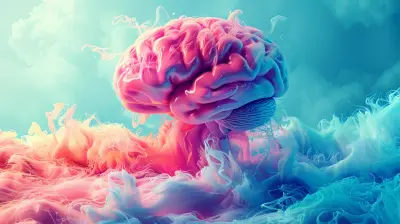Building Self-Acceptance Through Mindful Awareness
12 March 2025
Self-acceptance is a concept we hear thrown around a lot—but what does it actually mean, and how can we cultivate it? In a world filled with constant comparison and external pressures, building self-acceptance can feel like climbing a mountain barefoot. But here's the good news: You don't have to tackle it all at once. By incorporating mindful awareness into your everyday life, you can start to nurture a kinder, more compassionate relationship with yourself.
In this article, we'll explore how mindfulness can help you embrace who you are, flaws and all, and why self-acceptance is so crucial for your mental well-being. Whether you're new to mindfulness or have been practicing for a while, this guide will provide practical tips and insights to help you on your journey toward greater self-acceptance.

What is Self-Acceptance?
Before we dive into the role of mindfulness, let's first define self-acceptance. At its core, self-acceptance means recognizing and acknowledging all parts of yourself—both the good and the not-so-good—without judgment. It's about embracing your strengths, weaknesses, imperfections, and quirks as part of the whole "you."Now, that doesn't mean you stop striving to grow or improve. It simply means you accept yourself as you are in this moment, rather than constantly feeling like you need to "fix" yourself.
Here's a helpful analogy: Think of self-acceptance as being like a garden. Some days the flowers are in full bloom, and other days there are weeds. Both are part of the garden. You don’t get rid of the garden just because weeds show up, right? Instead, you tend to it with patience and care while appreciating its beauty as a whole.

Why is Self-Acceptance Important?
Self-acceptance is the foundation for a healthy sense of self-worth and mental well-being. Without it, we may get stuck in cycles of negative self-talk, self-criticism, and even self-sabotage.When you lack self-acceptance, you’re constantly striving for an impossible standard of perfection. And let’s face it—perfection is a myth! This can lead to feelings of inadequacy, low self-esteem, and even anxiety or depression. On the flip side, when you practice self-acceptance, you create space for self-compassion, inner peace, and emotional resilience.
Think of it this way: If you're constantly battling yourself, it's like trying to drive a car with the emergency brake on. You may move forward, but it's a struggle. Self-acceptance is like releasing that brake, allowing you to move freely and confidently through life.

What is Mindful Awareness?
Mindful awareness or mindfulness is the practice of paying attention to the present moment without judgment. It’s about being fully present in whatever you're doing, whether it's eating, walking, or even sitting in silence.Imagine your mind as a radio that's constantly tuned into multiple stations: thoughts about the past, worries about the future, and judgments about the present. Mindfulness helps you dial down the static and focus on the present station. It trains your brain to observe your thoughts and feelings without getting caught up in them.
By practicing mindful awareness, you become more in tune with your internal experiences, which can help you develop a deeper understanding of yourself. And guess what? That’s where self-acceptance comes into play.

The Connection Between Mindfulness and Self-Acceptance
So, how exactly does mindfulness help with self-acceptance? At first glance, they might seem like two separate concepts, but they are deeply intertwined. Mindfulness teaches you to observe your thoughts and feelings without judgment, and this non-judgmental stance is key to developing self-acceptance.1. Mindfulness Helps You Recognize Your Inner Critic
We all have that pesky inner critic—the voice in our heads that tells us we’re not good enough, smart enough, or successful enough. Mindfulness helps you become aware of that critical voice, rather than letting it run the show.When you practice mindfulness, you develop the ability to observe your thoughts from a distance. You can catch yourself when you're being self-critical and choose not to engage with those negative thoughts. Over time, this helps quiet the inner critic, making space for more compassionate self-talk.
2. Mindfulness Encourages Non-Judgmental Observation
One of the core principles of mindfulness is non-judgment. This means observing your thoughts, emotions, and experiences without labeling them as "good" or "bad."For example, imagine you're feeling anxious about an upcoming presentation. Instead of thinking, "I shouldn’t feel this way" or "I hate that I’m always nervous," mindfulness encourages you to acknowledge the anxiety without attaching a judgment to it. You might say, "I notice I’m feeling anxious right now," and simply allow the feeling to be there.
This non-judgmental stance is crucial for self-acceptance. When you stop judging yourself for your feelings, flaws, or mistakes, you create space for acceptance. You begin to see yourself as a whole, complex person who is worthy of love and compassion.
3. Mindfulness Helps You Stay in the Present Moment
Often, our lack of self-acceptance comes from dwelling on past mistakes or worrying about the future. We ruminate on things we wish we had done differently, or we stress about how we’ll measure up in the future.Mindfulness anchors you to the present moment, helping you let go of these excessive worries. By focusing on the here and now, you can accept yourself as you are in this moment, rather than getting caught up in who you were or who you think you should be.
Think of it like this: Imagine you're carrying a heavy backpack filled with stones—each stone representing a regret from the past or a worry about the future. Mindfulness helps you take off that backpack, lightening your load and allowing you to move forward with greater ease.
4. Mindfulness Cultivates Self-Compassion
Self-compassion is a vital component of self-acceptance, and mindfulness is a powerful tool for cultivating it. When you're mindful, you're more likely to treat yourself with kindness during difficult moments, rather than beating yourself up.For example, when you make a mistake, instead of saying, "I’m such an idiot," mindfulness encourages you to respond with, "It’s okay. I’m human, and I make mistakes. I’ll learn from this and move on."
This shift in perspective helps you develop a more compassionate relationship with yourself, which in turn strengthens your self-acceptance.
Practical Tips for Building Self-Acceptance Through Mindfulness
Now that we've explored the connection between mindfulness and self-acceptance, let’s get into some practical tips for incorporating mindful awareness into your daily life to foster greater self-acceptance.1. Start a Daily Mindfulness Practice
You don’t need to spend hours meditating to reap the benefits of mindfulness. Even just 5-10 minutes a day can make a big difference. Set aside a few minutes each morning to sit quietly, focus on your breath, and observe your thoughts without judgment.Over time, this practice will help you become more aware of your inner dialogue and more skilled at interrupting negative self-talk.
2. Practice Self-Compassion Mantras
Whenever you catch yourself being self-critical, pause and replace the negative thought with a self-compassionate mantra. For example, you might say, "I am enough just as I am," or "It’s okay to not be perfect."These mantras can serve as gentle reminders to be kinder to yourself and to embrace your imperfections.
3. Engage in Mindful Journaling
Journaling is a fantastic way to practice mindfulness and reflect on your thoughts and feelings. Set aside time each day to journal about your experiences, paying attention to your emotions without judgment.For example, you might write, "Today I felt frustrated because I didn’t meet my deadline. I notice I’m feeling disappointed in myself, but I also recognize that I’m doing my best."
This process helps you acknowledge your emotions without getting swept away by them, which is a key aspect of self-acceptance.
4. Practice Mindful Body Awareness
Our bodies often carry the tension, stress, and negative emotions we feel about ourselves. Practicing mindful body awareness can help you reconnect with your physical self in a more compassionate way.Take a few minutes each day to do a body scan, slowly bringing your attention to each part of your body, from your toes to your head. As you do this, notice any areas of tension or discomfort, and send kindness and compassion to those areas.
5. Embrace Imperfection
Finally, remember that self-acceptance doesn’t mean you have to love every single part of yourself all the time. It’s okay to have moments of self-doubt or frustration. The goal is not perfection—it’s progress.Embrace your imperfections as part of the human experience. After all, it’s our flaws that make us unique and interesting. So the next time you catch yourself thinking, "I should be better," gently remind yourself, "I’m already enough."
Conclusion
Building self-acceptance through mindful awareness is a journey, not a destination. It takes time, patience, and practice. But by incorporating mindfulness into your daily life, you can learn to approach yourself with greater compassion, understanding, and love.Remember, self-acceptance isn't about being perfect—it's about being real. So embrace your quirks, acknowledge your flaws, and celebrate your strengths. You are worthy of acceptance, just as you are.
all images in this post were generated using AI tools
Category:
MindfulnessAuthor:

Janet Conrad
Discussion
rate this article
8 comments
Reina Underwood
This article highlights the profound connection between mindful awareness and self-acceptance. By cultivating present-moment awareness, we can gently confront our insecurities and foster compassion for ourselves. Embracing this practice not only enhances emotional resilience but also empowers us to live authentically, embracing our true selves without judgment.
April 3, 2025 at 4:47 PM

Janet Conrad
Thank you for your insightful comment! I'm glad you found the connection between mindful awareness and self-acceptance compelling. Embracing these practices truly can transform our relationship with ourselves.
Quentin Harris
This article beautifully highlights the importance of mindful awareness in fostering self-acceptance. By practicing mindfulness, we can cultivate a deeper understanding and appreciation of ourselves, leading to greater emotional resilience and inner peace. Embracing our true selves is a powerful step toward overall well-being. Great read!
March 29, 2025 at 3:54 PM

Janet Conrad
Thank you for your insightful comment! I'm glad you found the article meaningful. Mindful awareness truly is key to fostering self-acceptance and well-being.
Olympia Hahn
Embracing mindful awareness truly transforms self-acceptance—it's like giving yourself a warm hug of understanding and love.
March 22, 2025 at 4:10 PM

Janet Conrad
Thank you for your beautiful perspective! Mindful awareness indeed nurtures self-acceptance, allowing us to embrace who we are with compassion and love.
Harrison McPherson
Mindful awareness fosters genuine self-acceptance and personal growth.
March 21, 2025 at 5:46 AM

Janet Conrad
Thank you for your insightful comment! I completely agree—mindful awareness is a powerful tool for nurturing self-acceptance and facilitating personal growth.
Octavia Valentine
Mindfulness fosters deeper self-acceptance journey.
March 18, 2025 at 4:54 PM

Janet Conrad
Absolutely! Mindfulness allows us to observe our thoughts and feelings without judgment, paving the way for greater self-acceptance.
Caitlin Bailey
Embrace silence; discover hidden truths within.
March 17, 2025 at 5:07 PM

Janet Conrad
Absolutely! Silence allows us to connect deeply with ourselves and uncover profound insights that foster self-acceptance.
Isabella McKinley
Self-acceptance flourishes when we embrace our authentic selves with mindful awareness.
March 12, 2025 at 5:32 PM

Janet Conrad
Thank you for your insightful comment! Embracing our authentic selves truly is a key component of cultivating self-acceptance.
Darius Patterson
Loved this article! 🌟 Embracing mindful awareness is such a powerful tool for self-acceptance. It’s amazing how tuning into our thoughts can transform our relationship with ourselves. Thank you for sharing!
March 12, 2025 at 4:21 AM

Janet Conrad
Thank you so much for your kind words! I'm glad you enjoyed the article and resonated with the message of mindful awareness. 💖
MORE POSTS

The Challenges of Learning Disabilities in Online Education

Using Mindfulness to Stay Grounded During Conflicts

Strengthening Your Mind for Personal Growth and Transformation

Mental Toughness and the Journey Toward Self-Mastery

The Neuroscience of Creativity: How Our Brains Innovate

Personality Types and Leadership Styles: What They Reveal About You